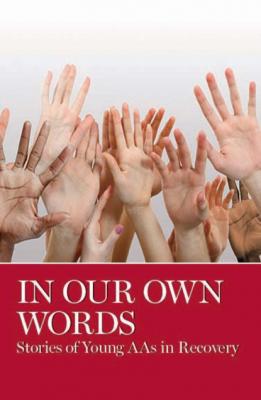In Our Own Words. Группа авторов
Читать онлайн.| Название | In Our Own Words |
|---|---|
| Автор произведения | Группа авторов |
| Жанр | Руководства |
| Серия | |
| Издательство | Руководства |
| Год выпуска | 0 |
| isbn | 9781938413322 |
Keep Coming Back — No Matter What
Section Five: FAMILY CONNECTIONS
Section Six: FRIENDS WE HAVEN’T MET YET: Working and Playing with Others
A New Generation of Old-Timers
Section Seven: HAPPY, JOYOUS, AND REAL
The Most Beautiful Word in the English Language
FOREWORD
Getting sober and staying sober isn’t easy at any age. But its starting place is clearly marked: “Recovery begins when one alcoholic talks with another alcoholic, sharing experience, strength, and hope,” says one foreword to the book Alcoholics Anonymous. It begins with stories like the ones in this book.
Most of us alcoholics are convinced that we are different, that we are too young or too old, too smart or too savvy to have a problem with drinking; we couldn’t possibly be drunks. But, after hearing other peoples’ stories, we discover that no one is immune to suffering. Others have felt the same soul-searing pain that we have. Others have felt just as desperate, angry, and afraid. After listening to AA members’ stories, we realize that other people understand us. We are not alone. People like us recover. We begin to have hope.
That is what you can find in this volume. A collection of stories by AA members who got sober in their teens, twenties, and early thirties, In Our Own Words not only articulates some of the difficulties faced by alcoholics young in years, but also describes some of the sober joys that await.
The stories in Section One are candid accounts of the drinking lives of ten young alcoholics. Some, like “Wanted” and “Far from Innocent,” depict the dark places that drinking took the writers. Others, like “Ten Minutes of Oneness,” capture the emotional and spiritual ravages that many alcoholics endure.
The stories in Sections Two through Four point to a way out. Talking about how they managed to get and stay sober, the writers describe what happens in meetings, how others have helped them, and the impact that practicing the principles of AA has had on their lives. In Sections Five through Seven, the stories describe what life in recovery can be like. In “Family Connections,” writers reflect on the unexpected ways AA can heal families; in “Friends We Haven’t Met Yet,” AAs discover the unexpected pleasures of helping others; and in “Happy, Joyous, and Real,” they describe the challenges and rewards of finally learning to live and love, one day at a time.
Each day, somewhere in the world, recovery begins when one alcoholic talks with another alcoholic, sharing experience, strength, and hope.
Alcoholics Anonymous
Foreword to Third Edition
Haven’t You Had Enough?
AS I SAT IN MY CHAIR and looked around the room, I thought to myself that there was no way I belonged with these people. So what if I drank a little more than my friends? An alcoholic I was not. I was too young.
I started drinking at the age of eleven. When I drank, I became funny and beautiful, and it seemed to me I had friends. But somewhere along the way I crossed an invisible line. And drinking was no longer something I could choose. My friends had begun to say, “Haven’t you had enough?” But as drunk as I was, I had just started.
My self-esteem vanished. I was no one. Only when a guy said I was beautiful, did I even think, “Maybe I’m alright.”
I hated the sight of what I’d become. I started to isolate. I became suicidal. My parents, not knowing that I was drinking, didn’t know what to do with a depressed teenager.
Then I found tequila, and during my last year of drinking, I never drew a sober breath. I drank to the point of no friends and no self-worth. No one could trust me, not even my parents. The next day, I was in a thirty-day treatment program. That day, sobriety began. It was March 21, 1988. I was thirteen years old.
Today, I know who I am. Very proudly in my meetings I announce that I am an alcoholic. I pray daily, even just to ask my Higher Power (whom I choose to call God) to walk with me that day. He has never left me, even when I have left him. I’m active in AA — shaking hands, chairing meetings, making coffee, reading, and sharing my experience, strength, and hope. I try to live the Twelve Steps of AA. I’ve
